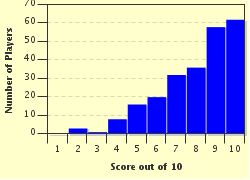Quiz Answer Key and Fun Facts
1. Which of the following sentences contains a CONJUNCTION?
2. In the following sentence, choose the part of speech of the capitalised word.
What ACTION will be taken after the meeting?
3. In the following sentence, choose the part of speech of the capitalised word.
One ACTS as one thinks best.
4. In the following sentence, what part of speech is the capitalised word?
The members who were there played ACTIVE parts.
5. In the following sentence, choose the part of speech of the capitalised word.
He was ACTIVELY engaged on the project.
6. The rule we learnt in school was "i" before "e" except after "c". However this rule does not always apply. Write the correct (British) spelling for: "N..GHBOUR".
7. A prefix is something that goes before. Which one is actually an example of a word that includes a prefix?
8. Which of the following sentences contains a preposition?
9. There are two types of articles, definite articles and indefinite articles. There is an example of a definite article in this sentence: "The store manager was in trouble for stealing".
10. Which sentence uses the adverb incorrectly?
Source: Author
ClaudiaCat
This quiz was reviewed by FunTrivia editor
looney_tunes before going online.
Any errors found in FunTrivia content are routinely corrected through our feedback system.


